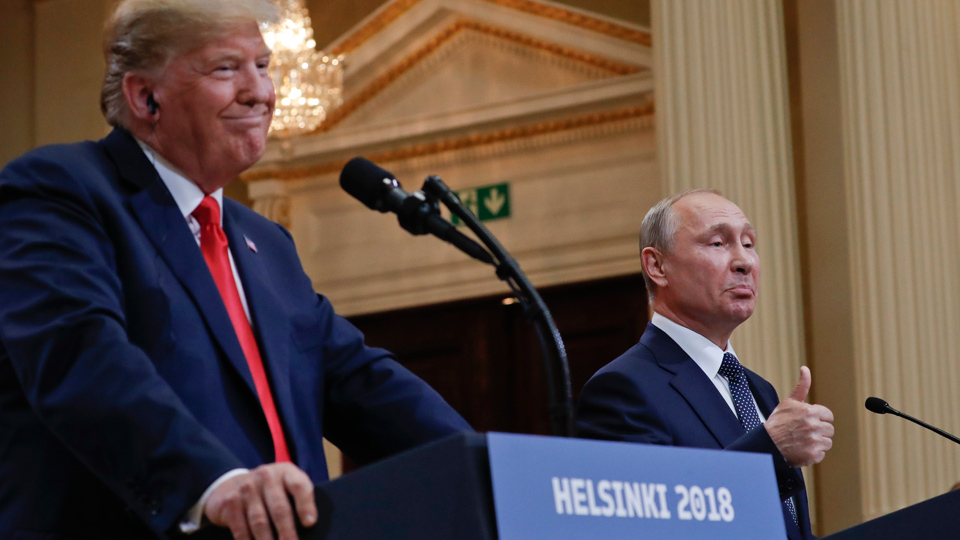
The big news cycle winner from the Trump-Putin summit, as was apparent to almost every observer, was clearly the Russian president. During the 45-minute press conference which wrapped up the meeting, Trump parroted Putin’s denials that Russia did nothing to interfere in the 2016 U.S. election, nothing to spread divisive racist and misogynistic propaganda to boost his campaign against Hillary Clinton.
Trump’s get-together with Putin has us all talking about election interference again, but there’s still not enough discussion going on about just how broad the capitalist attack on democracy globally really is. It’s an issue that encompasses not just whatever Moscow may have been up to in 2016, but also the voter suppression that Trump’s GOP has been engaged in for years.
Nor are we really getting to the heart of the matter when it comes to Trump’s rapprochement with Russia. There are serious class interests being pursued here on an international scale and exclusively focusing on campaign collusion isn’t going to tell us what’s really going on.
Treason, bribery, and other high crimes
Except for the fact that he said it while standing together (literally and figuratively) with Putin himself, denying any Russian credit for his own good electoral fortunes wasn’t new; Trump’s been sticking to that line ever since charges of interference first emerged.
But what was shocking at first glance, no matter your political, ideological, or class perspective, was that the frontman of American imperialism actually laid blame on the U.S. itself for Russian efforts to subvert democracy in this country. “I hold both countries responsible. I think that the United States has been foolish. I think we’ve all been foolish…. And I think we’re all to blame.”
That wasn’t enough for Trump, though. He went on: “I have great confidence in my intelligence people, but I will tell you that President Putin was extremely strong and powerful in his denial today.” FBI and CIA reports, National Security Agency reports, Homeland Security reports—all be damned. Putin said he didn’t do it, so that’s good enough for Trump.
This publication, People’s World, is, of course, no cheerleader for the various agencies of the U.S. intelligence apparatus. We’ve been on the receiving end of too much surveillance and suppression over the decades for that. But one doesn’t have to be a fan of those outfits to see that the evidence and indictments piled up so far over the last year and a half clearly point to efforts directed or carried out by the Russian state that were aimed at tilting the scales in Trump’s favor in 2016.
From Democrats, the condemnations of Trump were swift and forceful. “Nothing short of treasonous” was the description of his performance given by former Obama administration CIA Director John Brennan.
Senate Majority Leader Chuck Schumer, D-N.Y., again raised the possibility that Putin is blackmailing Trump with compromising material: “A single, ominous question now hangs over the White House: What could possibly cause President Trump to put the interests of Russia over those of the United States?” How else, Schumer wondered, can you explain the near groveling behavior of the usually boastful and egotistical Trump?
Perennial Trump foes within the Republican Party were also quick to jab the president over his apparent selling-out of America’s dominant role in the world. Arizona’s Sen. John McCain called the press conference “one of the most disgraceful performances by an American president in memory.”
Even some of Trump’s most reliable accomplices in the GOP felt compelled to offer a critique. House Speaker Paul Ryan contradicted Trump’s Putin apologetics, saying, “There’s no question that Russia interfered in our election…the president must appreciate that.” The head of the Senate Intelligence Committee, Sen. Richard Burr, R-N.C., meanwhile, called the claims made in Helsinki that Russia did not interfere “a lie.”
Getting serious about election integrity
If Republican elected officials honestly accept Russian guilt, then surely they are eagerly doing everything possible to protect our ballots as we head into another election, right?
Don’t count on it.
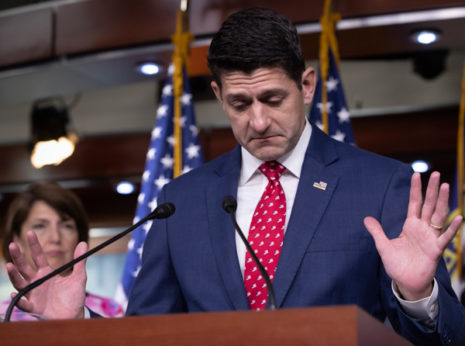
The fact is that there’s already legislation proposed in Congress which would provide greater security and protection for American elections. It’s called the Securing America’s Future Elections (SAFE) Act. If passed, it would designate electoral integrity as a national security interest and put all election infrastructure—polling places, voting machines, vote storage databases, and more—in the same category as things like the power grid and banking system. It would provide funding to upgrade the cybersecurity of voting software and also require voting machines to issue paper ballots as a verification measure.
It was proposed over a year ago by Rep. Mark Pocan, D-Wisc., and backed by Reps. Keith Ellison of Minnesota and Hank Johnson of Georgia—all members of the Congressional Progressive Caucus.
It’s doesn’t cover everything, but the SAFE Act is certainly a good start at protecting our elections. If it were matched up with a full restoration of the Voting Rights Act, legislation overturning the Supreme Court’s 2010 Citizens United ruling, which opened the floodgates of corporate campaign cash, and an end to gerrymandering and strict voter ID laws, then we’d really be getting somewhere on making our elections more democratic.
The number of Republicans currently supporting the SAFE Act or any similar legislation? Zero.
If they are really committed to, as Paul Ryan said, “putting an end to [Russia’s] vile attacks on democracy,” shouldn’t they be rushing to back Pocan’s plan?
The reason they aren’t, of course, is because it’s not just Russian election interference that is in the SAFE Act’s crosshairs. Domestic voter suppression—a tried-and-true tactic of Republican officials—is also targeted by the bill. Specifically, it provides a shot in the arm to the Election Assistance Commission, the federal agency tasked with updating and overseeing the nation’s local election systems—an agency which the Republicans have been trying to abolish.
The bill would extend the life of the EAC by ten years and require it to randomly audit five percent of all wards/precincts in each state to ensure that electronic vote totals match up with the paper ballot receipts voters get when making their choice.
For a party known for restricting the number of polling places in African-American, Latino and working-class districts, of cooking the books on election numbers, and of running voter disinformation campaigns, any possibility that a federal ballot watchdog could be auditing local results is just too great a risk.
Understanding “America First”
As for Trump himself, his “America First” rhetoric regularly descends into a “Me First” litany of excuses, distractions, and self-promotion. His apparent lack of command of even the most basic details of the international economic and geopolitical situation leaves him swinging wildly from one day to the next.
Behind the man himself, though, there are more coherent forces pushing for a redrawing of the international order. Trump may seem incompetent, but there is a logic to many of his actions—whether it be destabilizing NATO or embracing Russia’s autocrat.
A couple of ideologues, professor Daniel Quinn Mills (long-time professor at Steve Bannon’s alma mater, Harvard Business School) and Steven Rosefielde (anti-Communist economics professor in North Carolina), laid out the vision in a little noticed 2017 book published in far-off Singapore.
In The Trump Phenomenon and The Future of U.S. Foreign Policy, the two argue that the post-World War II “Western world order” is dying, with institutions like NATO proving more a burden than a help for the U.S. empire. At home, the country is in a state of “decay.” The dynamics of “population growth, immigration, and the politics of inclusiveness,” they claim, “are weakening the nation state.”
Their solution? America has to shift away from “international cosmopolitanism” toward a nationalist and explicitly imperial policy to assert its power in the world. In an updating of the realpolitik of the 1970s, the U.S. should seek a “Cold Peace” of competition with Russia rather than a “Cold War” mindset rooted in the NATO alliance. The assumption is that Putin is following such an outlook, and by doing likewise, war between the two powers can be avoided and American capitalist interests can go about their business while other challengers to U.S. power, specifically China, are contained.
And in dealing with other smaller countries, progress can be made by backing similar nationalist and anti-cosmopolitan forces. (The authors’ repeated critiques of cosmopolitanism and high finance bear a resemblance to older anti-Semitic propaganda that is hard to miss.)
There are also divisions within the capitalist class at work here. Remember that the globally-oriented U.S. financial sector, for the most part, was never in favor of Trump’s nomination and election. They’ll take the tax cuts and deregulation he offers of course, but someone who is regularly threatening to restrict free trade is not the first choice of international banks. The turn toward a more unilateral, great power approach is more in line with the interests of energy, natural resource, and (some parts of) manufacturing capital in the U.S.
Trump often seems to be reading from the script written by Mills and Rosefielde, but his own election tie-ups with Putin and the Russian state often overshadow any ideological analysis of what’s going on. The easy explanation is just to say Putin helped him win, so Trump toes his line.
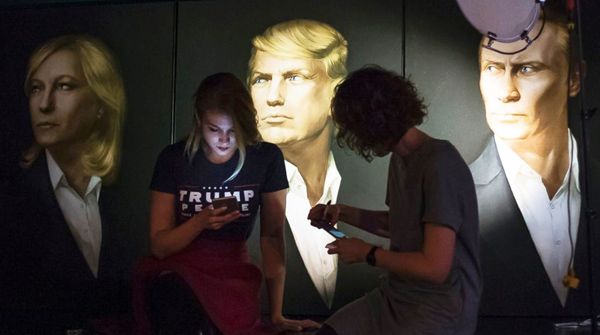
But there is a bigger attack on democracy underway here as well as the pursuit of an agenda belonging to particular sectors of the capitalist class. And while the dismantling of NATO and a re-ordering of the world in favor of peaceful relations and the end of militarism would be a good thing, that’s probably not the kind of outcome planned by Trump or Putin. In other, more transparent circumstances, it might even be possible to welcome such diplomatic overtures between long-time nuclear-armed adversaries (as was the case with North Korea), but the secret nature of their discussions and the election tampering shadow make it hard to get excited.
Despite the uproar over his stage show with his fellow autocrat, however, there were developments that came out of his trip to Europe that Trump can mark as personal achievements.
He had the opportunity to further boost the emerging nationalistic, xenophobic, and militaristic global right-wing alliance everywhere he went. At the NATO meeting in Brussels, he argued for a ramp-up in military spending, pushing for ever more financial resources in Europe and North America to go toward war preparations. In Britain, he put the spotlight on the buffoonish anti-immigrant politician and former cabinet member Boris Johnson, suggesting he’d make “a great prime minister.”
And in a nod to the rhetoric of neo-Nazis and white nationalists across the continent—as well as back home in the U.S.—he lamented how Europe was “losing its culture” because of immigrants. It was, in essence, a call to “Make Europe Great Again”—like it used to be, before too many darker-skinned people supposedly invaded.
Turning them out
Whether it is Trump’s tax cuts for the super rich in America or Putin’s indifference to millions of Russian workers who go unpaid for months at a time, the true interests these two wannabe dictators and their imitators in far-right parties across Europe serve is apparent just by looking at their policies. It is never working-class people or the racially and nationally oppressed who benefit from their actions.
The surest way to put the brakes on these international attacks on democracy and the working class is to stop Trump’s agenda at home by mobilizing every co-worker, family member, and friend to hit the polls in November.
Taking control of Congress out of the hands of the Republican Party will open up the possibility of not only safeguarding our ballots, but also protect the Mueller probe from being squashed by Trump. Its continuation is another essential part of protecting democracy. All of these things will help put in place a roadblock against further anti-working class policies from the president and his enablers in Washington.
Authoritarians like Trump and Putin are the instruments for a class-based assault on working people, for democracy is a terribly annoying thing to capitalism. The Russian president has already done much to get rid of democracy in his country, and if Trump is not stopped, he would love to do the same here.
From the start, however, Trump has always only had the support of a minority of voters in the United States. His core base, so far, has stood by him no matter what he says or does, but even the GOP is now worried after Trump’s disastrous performance at the Helsinki press conference.
The overwhelming working-class majority in America, however, benefit nothing from the rule of Trump and the GOP. If that majority is mobilized, the authoritarians and their big money backers can be stopped.
Like free stuff? So do we. Here at People’s World, we believe strongly in the mission of keeping the labor and democratic movements informed so they are prepared for the struggle. But we need your help. While our content is free for readers (something we are proud of) it takes money — a lot of it — to produce and cover the stories you see in our pages. Only you, our readers and supporters, can keep us going. Only you can make sure we keep the news that matters free of paywalls and advertisements. If you enjoy reading People’s World and the stories we bring you, support our work by becoming a $5 monthly sustainer today.




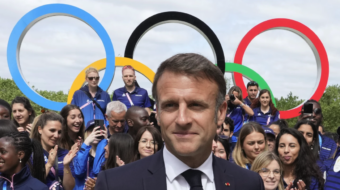
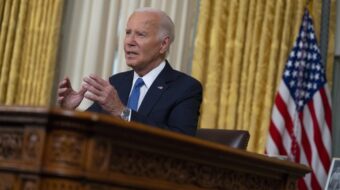






Comments